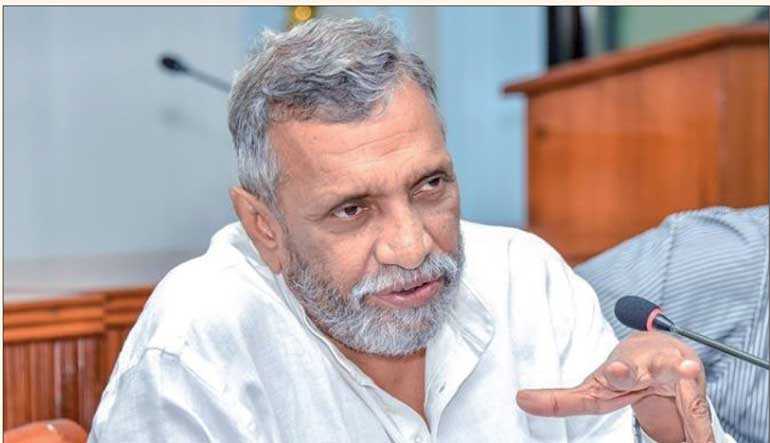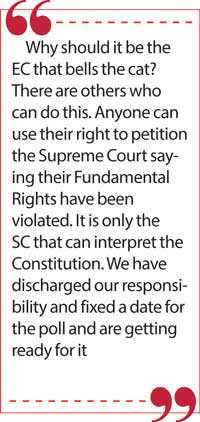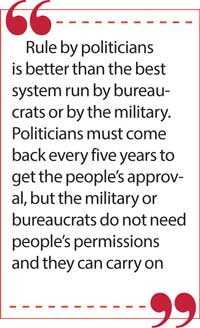Sunday Feb 22, 2026
Sunday Feb 22, 2026
Friday, 1 May 2020 00:08 - - {{hitsCtrl.values.hits}}

EC Chairman Mahinda Deshapriya
With 20 June fixed for the Parliamentary Election, there is intense interest in how the Election Commission (EC) plans to deal with the crisis situation caused by the COVID-19 pandemic and ensure that a free and fair election is held amidst a public health emergency. EC Chairman Mahinda Deshapriya, who has more than 35 years of experience in the department/commission, says the challenges posed by COVID-19 are unlike any of the usual hurdles that get in the way of elections in the country and the EC has to ensure that an election is held within a reasonable period of time and also that it is a free, fair, transparent and credible poll. In an interview with the Daily FT, Deshapriya spoke of the importance of holding elections but also ensuring that there is a level playing field for all stakeholders. Here are excerpts of the interview:
By Chandani Kirinde
Q: On what basis did the EC decide on 20 June for the election?
A: After the conclusion of the Presidential Election, from December onwards there was talk that Parliament would be dissolved at the end of its four-and-a-half-year term. The EC too was consulted,

and we advised that the Government seek the opinion of the Attorney General on when the said term ends. Based on the AG’s advice, President Gotabaya Rajapaksa dissolved Parliament on 2 March. After several rounds of discussions, the EC first fixed 25 April as the date of the poll. It was after that the COVID-19 situation began impacting the country and we had to postpone the election and appoint a new date for the poll, which is 20 June.
Q: Can the EC go ahead with the poll?
A: The country is still not normal to hold an election. There must be a minimum of 35 days prior to date of the poll for campaigning, preparation for poll, etc. It is not only the freedom for voters to go to the polling booth and vote that has to be looked into but also for officials and candidates to engage in related activities freely. Without that there will be no free and fair election.
At present there is a curfew between 8 p.m. and 5 a.m. Not even a pocket meeting can be held due to physical distancing regulations to deal with the coronavirus. There is no normalcy in the country at the moment but we have announced an election date so we can’t fold our hands and sit back. We are preparing for the election.
We have given dates for submission of postal votes, etc., but we must assess the situation regularly. The EC must meet and decide on the future course of action and we also have to consult with election officials and others like the Postal Department, Returning Officers, and the Grama Sevaka Niladaris.
Public Health Inspectors (PHI) function as Senior Presiding Officers (SPOs) and so do others in the health sector. Their availability is also must be assessed. The EC must meet at least once in every 10 days to assess the situation and take a decision.
Q: Can we have a free and fair election under the present circumstances?
A: Not only free and fair but an election has to be transparent and credible. It is not only politicians but also officials who must be able to come and work without anxiety. In our country, the voter turnout is around 75-80% for national elections. We can expect a five to 10% drop due to this situation but if there

is a drop, for example, below 60%, it will affect the credibility of the election.
Q: Some say South Korea held an election amidst the coronavirus pandemic and so why can’t Sri Lanka do the same?
A: South Korea held an election. In that country counting is done by machines. They have a system which is a mix between First-Past-The-Post and Proportional Representation but they do not count preference votes like here. We do a hand count and then feed the information into the computers. How do we ensure that the two-metre distance is maintained at counting centres?
Then we have to first prepare a manual on how to hold elections during the coronavirus outbreak and then have the election. It is a time-consuming matter. If there is a constitutional problem, this problem must be taken care of by the relevant person. Our job is to give a date.
Q: How important is it to elect a new Parliament?
A: The country cannot run without a Parliament. There are some who is say the country is going on well without it, but in a democratic country, there are three pillars that must function separately and independently.
Under our Constitution it is the legislative power of the people that is exercised by elected representatives in Parliament. Sovereignty is with the people and it is vested in the people they elect to office. Even a simple exercise such as imposing a fine cannot be done without Parliamentary approval. We can’t make new laws relating to elections without Parliament. This talk of not wanting Parliament is just a trend now. It is the people of this country who elect these people, not foreign nationals.
Q: You wrote to the President’s Secretary saying there was a constitutional hurdle if Parliament did not meet by 2 June and then you fixed a date past that date to hold the election?
A: It is not a constitutional issue but a practical issue for us. It was practically not possible to hold an election on a date before 2 June. Constitutional experts must resolve the issues regarding the constitutional requirements. The EC does not like to step in there.
Q: But you sent a letter to the President?
A: Yes, we did send a letter, but we are not in a position to hold the election at the end of May so that Parliament can met by 2 June. We had to give a date and after many deliberations we agreed on 20

June.
Q: The EC can go to the Court of Appeal by way of a Writ Application to resolve some issues?
A:Why should it be the EC that bells the cat? There are others who can do this. Anyone can use their right to petition the Supreme Court saying their Fundamental Rights have been violated. It is only the SC that can interpret the Constitution. We have discharged our responsibility and fixed a date for the poll and are getting ready for it. The EC, and particularly I, get accused of supporting one side or the other. In 2015 I was accused of being on one side and when the Opposition won I was good, very democratic and the ones who were not critical of me up to that point started criticising me saying they lost because of me. When the elections were getting postponed also the EC was blamed but when the Local Authorities’ election was held and one side won they were praising the EC.
Q: There is provision to hold the election on a staggered basis. Have you discussed that possibility?
A: The EC has not discussed that. The law provides for it but staggered would also mean having the election a week or so apart. We cannot have it in one district today and a month later in another. All three commissioners must meet and discuss this.
Q: Are you under pressure from those in power or anyone else to hold the election?
A: No, this has never happened. Not now or in all the years I have been Commission Chairman or even before when I was in the Election Department. Even if they try it will not work. No one has tried to do that.
Q: Differences within the members of the Commission are been aired publicly of late. Doesn’t it undermine the EC?
A: There are differences, but our goal is the same; however, a lot of people say that it is damaging the credibility of the EC in the public eye. Once this happens it is difficult to rebuild it. We hope no one will wilfully discredit and demoralise the commission.
I cannot discuss publicly what is discussed inside the EC. It is not the practice nor the norm of the commission. We have to defend freedom of expression on one side and rules, regulations and norms of the commission on the other side. I cannot answer to every allegation even though I have the answers. There is a communication gap and small things are played out as big issues in the public arena.
One way the people’s faith in elections can get eroded is if the EC’s credibility is damaged, which is why we have appealed to the media to verify with the relevant officials before they report on internal discussions of the EC.
Q: One allegation is that you take decisions alone. Your comments?
A: What are the decisions I can make on my own? All three commission members must sign each gazette we issue. When one is not available, we hold meetings on Skype and take decisions. Most of the administrative decisions are taken by the Director General of the EC Saman Sri Ratnayake. In case of a tied decision, I have a deciding vote in the EC as I am its Chairman but in the past four-and-a-half  years, except for four or five decisions, all have been made by unanimously.
years, except for four or five decisions, all have been made by unanimously.
The Chairman’s post comes with more responsibility, which is why he is paid a bigger salary and why it is only the Chairman who is entitled to an official vehicle and others are given travel allowances.
Q: Is it the case because you are too high profile?
A: Yes, maybe everyone knows me and calls me “MaKo”. Then some say ‘how can he be called commissioner when there is no such post?’ That is why I wanted to step down as Chairman after the Presidential Election and continue as only a commission member. I am not happy about certain things and there is a limit to hearing differences in the EC being reported every day on social media and others. We must carry out our work. The EC term ends on 13 November and then there will be a new commission.
Q: Was the election fixed to coincide with the President’s birthday?
A: How do we know when the President’s birthday is? I only learnt about it after it was reported in a newspaper. Last time they said the election date was fixed to coincide with (S.W.R.D.) Bandaranaike’s birthday. In 2015 they said the election date was fixed according to an auspicious day for Prime Minister Mahinda Rajapaksa. If that was the case, how did he lose then?
Q: What do you say to those who say there is no need for an election and we can run the country without a Parliament?
A: That is completely wrong. The country cannot go there. No one, no former President or Prime Minister or anyone in any position, will agree with this. Rule by politicians is better than the best system run by bureaucrats or by the military. Politicians must come back every five years to get the people’s approval, but the military or bureaucrats do not need people’s permissions and they can carry on.
We are a democratic country. We have signed the Universal Declaration of Human Rights which states the will of the people shall be the basis of authority of government and this shall be expressed through periodic and genuine elections. So how can anyone say elections are not needed?